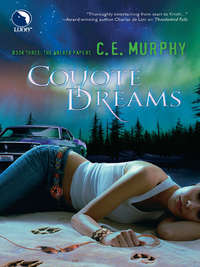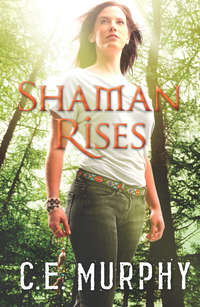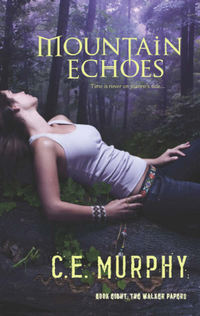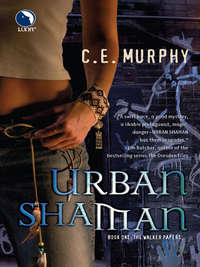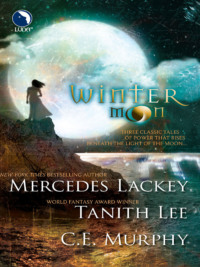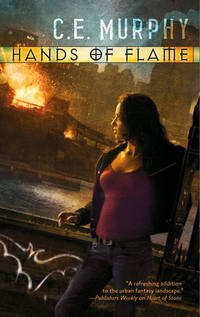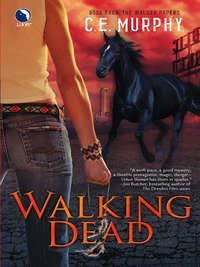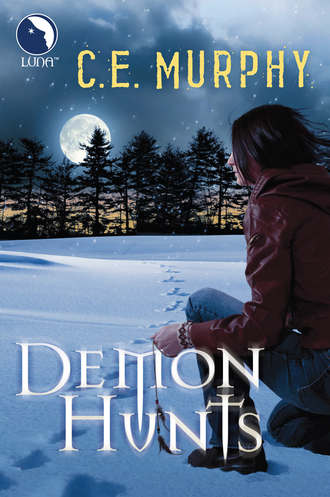
Полная версия
Demon Hunts
“Most of them.” My heartbeat rabbited hard enough I was surprised my voice didn’t shake. “Heather, that’s where I live.”
“Jesus Christ. Did you know her?”
I shook my head even as I tried to draw some hint of recognition from her profile. “I don’t remember ever seeing her, but there are forty apartments in that building. People are always moving in and out. God, how horrible.” Her death hit me harder, all at once, than any of the others had. Not because I was afraid it could’ve been me, but because I might have known her. The fact that I hadn’t was irrelevant. I found myself making a silent promise that we’d find her killer, like I’d been previously lacking motivation and only just now really meant it.
I said, “Shit,” under my breath and tried to pull my thoughts back to what Heather’d been saying before ID’ing the girl to me. That was the only way I was going to keep the stupid little promise I’d just made. “How did they dump her? There’s no skid marks, so she wasn’t thrown out of a vehicle. She looks like she was placed here, but there aren’t any footprints.”
Heather stalked back to my side. With her winter hat and boots on, she came up to my eyebrow, which made her taller than most of the women I knew. “I know. It’s been the same thing all over the city. No matter where we find the body, no matter how long we think it might’ve been there, there’s no indication that anybody carried it there. She hasn’t been dropped, either.” A circling finger encompassed Karin Newcomb’s form. “No spray of snow, and since neither rigor mortis nor the cold has set in, there should be some displacement of limbs if she had been. Instead she’s nestled up perfectly. It’s like—”
She bit her tongue on the last word: magic. “Yeah,” I said, willing to go where she wasn’t. “It is.”
I crouched, flashlight bouncing a long oval off the snow as I examined the scene with the Sight again. Individual flakes, loosely packed, turned into a river of blue glitter under my gaze, but even then I didn’t see footprints. Not in the snow, at least. The ridges beneath it, though, resolved into ten long narrow strips, five and five with a few inches of space between them. Roundish marks cupped the bases of both sets of ridges. I rocked forward in my crouch so I could feel the balls of my feet press into my insoles. Snow creaked under my boots, warning me of the impressions I was leaving behind.
Impressions that the killer hadn’t left. Somehow his weight had been transferred through the delicate crystals and into the earth below. “Heather, I need to scrape away some of the snow.”
To her credit, she only said, “Where?” instead of arguing with me. Up until very recently, if I’d been in her shoes, I’d have argued. Not for the first time, I gave thanks that the people around me weren’t as obstreperous as I was, then gestured to the curve of the dead woman’s back. There were other marks beneath the snow, but the crouched set had the most weight to them, as if they might last longer and give more information about what had left them.
Heather stepped forward, her aura a brilliant, efficient red. I put the flashlight in her hand with an apologetic grimace. “I know this is your job, but I’m afraid someone else’s hands in there might contaminate what I’m seeing. If something comes up, there’ll be plenty for you to examine.”
Her aura leeched toward ice blue, a color that became audible in her tone, too. “If something comes up.”
I sighed. “Yeah. I might be imagining things.” It was a better answer than it’s magic. Even if she’d heard the rumors about my predilections—and she had, or she wouldn’t have bitten off her magic comment a minute ago—normal people didn’t want their police work done by psychics and shamans. I suspected someone with a degree in Forensic Sciences really, truly and deeply didn’t want it’s magic as an answer for anything.
Heather exhaled sharply. I took it as permission and began brushing snow back from the frozen earth, trying not to disturb anything more than the narrow strips where I saw footprints in one level of my double vision. After a minute I scraped my way down to the ground, verifying that my eyes couldn’t see what the Sight did. I breathed a curse and shook my head at Heather. “There’s not going to be anything here that’ll do you any good. I’m sorry.”
“Then you can get out of my crime scene, Detective, and let my people get back to work.”
“Yeah, in just…” I stripped my glove off and slid my hand into the hollow I’d dug. A hillock of snow collapsed over my fingers, sending cold shivering through me.
It had nothing on the black ice beneath my palm. It sucked away my body heat with a willful vengeance, like it wanted to drag me in and abandon me in the cold. I jerked back with an ingénue’s gasp and coiled my other hand around my fingers. The ridges in the earth had flattened, like I’d put pressure on them. The notion that cold was all they were made of, and that my warmth had negated their chill, lingered in my thoughts.
Still cradling my hand, I pushed to my feet and turned in a slow circle, scanning the nearby earth for more of the narrow-toed footprints. Nothing: not on the ground, and not scored into any nearby trees. “It couldn’t just disappear.”
Morrison, a few feet away, said, “It?” and Heather drew herself up more stiffly.
I uncradled my hand and pinched the bridge of my nose with those fingers, half surprised they were willing to bend without shattering. “It. Him. Whatever. Billy, have you got…?”
God, how I’d changed. Billy and I usually retreated to The Missing O, a coffee and doughnut shop near the precinct building, to discuss the more unusual aspects of our cases. A few months earlier if anybody had told me I’d ask him straight out, in public, if he was getting a read on a ghost, I’d have sent some nice young men in clean white coats after them. I still wasn’t quite bold enough to spell it out, but none of us—not me, not Billy, not Morrison, and probably not Heather, since Billy’s fondness for the paranormal was legendary in the precinct—needed me to. We all knew what I was asking.
Billy came the long way around the body, his face tight. “Could be that she’s clinging to the location she died in.”
Heather made a disgruntled sound under her breath and walked away. Billy and I watched her, neither of us wanting to look at Morrison as I said, “But you don’t think so.”
“I don’t know.” My partner pulled his hand over his mouth. “I’ve never run into it before. Ghosts are usually tied to their physical forms, so even when the body is dumped they go with it. It could be there’s some kind of trap in place to keep them where they’re dying, though. Maybe…” He shot a guilty look at Morrison, who blew a breath from puffed cheeks.
“Go ahead, Holliday. Let’s hear your supposition.”
“That’s all it is, sir. Conjecture. But this guy is eating, or at least tasting, these bodies. If it’s something that feeds on human souls, then the physical desecration might be secondary to the spiritual one. It could be that chewing the bones is representative of…” He trailed off as Morrison got one of those looks that I recognized as something I usually triggered. It was one part disgust, one part disbelief and one part deliberate patience, all mixed well with resignation.
“Feeds on human souls.”
I said, “We’ve encountered it before, Captain,” in the smallest voice I possessed. Morrison turned his complicated expression on me, and it was all I could do to not dig a toe into the snow. “It’s essentially what Barbara and Mark Bragg were doing, sir, under Begochidi’s influence. Gathering strength by draining human lives. That’s what was putting everyone to sleep in July.”
Morrison looked to the sky, as if beseeching God to give him strength. I peeked at Billy, who shrugged his eyebrows, and we both came to attention as Morrison spoke again. “What I want to know,” he said, “is how I’ve spent twenty years in the force without ever hearing a hypothesis that it feeds on human souls on a case before.”
I didn’t really get the idea he was talking to us. Besides, that wasn’t what he wondered at all. What he really meant was, why was he now hearing that kind of hypothesis, when the world had been a sensible and straightforward place up until about a year ago.
The answer to that, of course, was me. One Joanne Walker, reluctant shaman thrust into a life that walked half a step out of pace with the normal world. Billy’s talents had always helped him solve cases. They hadn’t brought the truly bizarre to the fore. I was the one who fought gods and tangled with demons on the department’s time. I was coming to believe that all of those things—gods, demons, witches, spirits—had always been there, slipping alongside the real world and going more or less unnoticed. Sometimes cases went unsolved, or inexplicably strange things happened in them, but it took a mirror to show most people the explanation for those incomprehensible events.
I was that mirror. Without me, last winter’s ritual murders would have been just that, with no banshee’s head to show as a prize. Without me, no one would have seen a thunderbird battle a serpent over Lake Washington, or gone traipsing through dream worlds to share secret moments in each other’s souls. I’d come around to believing in magic, but forcing those around me to believe, too, wasn’t something I liked at all.
I said, “I’m sorry,” very, very quietly.
“You’re saying that too often lately, Walker.” Morrison shoved his hands into the pockets of his seaman’s coat and hunched his shoulders before letting them fall in a show of having given up the fight. “I called you two in for a reason. I shouldn’t bitch when you do what I brought you in to do. This hypothesis. Tell me how it would work.”
To my dismay, Billy lifted his eyebrows at me. I was the slow kid in class, the one scrambling through years of make-up work. If either of us had an answer, it should be him.
Well, really, I should have one, too. I pushed my hat off and scruffed my fingers through my hair, staring at the dead woman. “If it’s murder by magic, if somebody’s trying to capture souls, then there’s probably some kind of power circle involved.” I shot a quick glance at Billy, who looked approving, and a second one at Morrison, who looked dangerously uncomprehending. “Like people would use in a horror movie,” I said lamely. “A pentagram, for example, but it doesn’t have to be a pentagram. You can use—”
I fumbled at my throat, flipping the thumbnail-sized pendant of my necklace above the collar of my shirt. It was a quartered cross wrapped in a circle, a symbol used by both sides of my heritage. In Ireland, it was the Celtic cross, older than Christianity’s, and for the Cherokee it was the power circle, all the directions encompassed by the universe. “You can use something like this, or probably anything else that’s meaningful to you. A peace symbol, maybe.” My attempt at a smile was met by Morrison’s steely gaze. “Anyway, you create your circle and invoke your patrons and when you’re done you have a sealed area that can either keep things in or out, depending on which you set it up for.” I’d participated in one fairly recently, or I’d have had no idea how to catch a wayward soul.
Morrison stared at me, or possibly at my necklace, for a long moment, then made his voice very steady. “All right. This power circle. Would it leave a mark?”
This time I got my expect-an-answer glance off first, planting it on Billy. His mouth pursed and he shook his head. “It might, but I wouldn’t be able to see it. Jo—”
“I don’t know if I can see residue, but I can check by looking for Mel’s. But if we have murder by magic—” I liked that phrase “—going on, then whatever mark it leaves isn’t going to be anything like Melinda’s. If I can see a shadow cast by hers, maybe I can figure out how to look for its opposite, but I can’t guarantee anything.”
“You have to,” Morrison said. “I’ve got nobody else.”
I breathed a laugh that wasn’t. “So no pressure, then. All right. Okay. I’ll try, Captain. I’ll do my best.”
He gave me a short nod, and I took a few steps back from the dead woman’s body. Police tape rustled against my hips and I turned to duck under it.
Blinding light erupted in my vision, and from out of it came a microphone and a woman’s voice: “Detective Walker. Laurie Corvallis from Channel Two News. I’m sure you remember me. What a delight to find you at the heart of another grotesque crime scene. What would you like to say to our viewers?”
CHAPTER THREE
The first eight or twelve things that sprang to mind were not answers Morrison would approve of. I squinted into the light and managed to pull up a terse smile in lieu of what I wanted to say. By the time I made out Corvallis’s silhouette against the brilliance, I’d come up with something other than chuck you, farley, and kept my voice as pleasant as I could. “Ms. Corvallis, I don’t find it at all delightful to be in the midst of a murder scene, and I think it’s dismaying that you do. Beyond that, no comment. Sorry.”
Truth was, I probably shouldn’t have indulged in that much commentary, but at least I got the satisfaction of seeing Corvallis’s lip curl like I’d made a palpable hit. I ducked out of the camera light, blinking furiously to readjust to the dark, and heard Morrison’s grim, “Ms. Corvallis. What do you think you’re doing here?” behind me. I turned back to watch them, glad to be out of the spotlight.
Corvallis was just a little over five feet tall and had some kind of truly American ethnic background that had graced her with epicanthic blue eyes and café latte skin to go with very straight black hair. On TV, I thought she was gorgeous. In real life, I thought she was a pain in the ass. Even so, I had to admire how she stood up to Morrison, whose ten inches in height advantage didn’t seem to faze her at all. “I’m trying to report a news story, Captain. You wouldn’t want the story to be about the police obstructing the media, would you?”
“I want to be able to notify the family before they see their daughter’s death as the lead story on the morning news,” Morrison snapped. “And I want you to heed the decision that came from over your head to leave this story alone until we get some kind of break on it. I understand that investigative reporting is your job,” he said over her protest, and to my surprise his voice softened. “But you know enough details on this case to understand how frightened people are going to be, and that it’s dangerous and disturbed enough without adding the possibility of copycat murderers.”
“So you admit this morning’s victim is the last in a long line of murders by the Seattle Cannibal?”
My mouth bypassed my brain and said, “You’re kidding. Seattle Cannibal? There’s nothing euphonious or catchy about that at all. Maybe the Seattle Slaughterer. At least that’s alliterative.” About halfway through the last word I tried stuffing my fist in my mouth to shut myself up, but it was far too late. Morrison and Corvallis both turned to me, and from Morrison’s expression I figured I could count what was left of my detecting career in a matter of hours. Possibly minutes.
Corvallis, on the other hand, was smiling. For a pretty woman, she looked remarkably like a barracuda. “The Seattle Slaughterer,” she echoed. “I like that. Thank you, Detective Walker. Anything else you’d care to add?”
Short of issuing an invitation to my forthcoming ritual suicide, I couldn’t think of anything. I shook my head and backed away before laser beams actually shot out of Morrison’s eyes and immolated me.
A few steps beyond the news crew, I ran into Gary, who caught me, then thumped the side of his cab as an invitation to pull up against the hood and lean. “You’re right. ‘Slaughterer’ is better than ‘cannibal.’ Still a mouthful, though.”
I groaned. “You’re not helping.”
“I figure I already did my bit of helping.” He sounded less pleased than he should, and I frowned at him. He lifted a big shoulder and let it fall in a shrug that, as always, reminded me of plate tectonics. “Cops ain’t using the regular frequencies to call around about these murders, doll. Cabbies listen in on those all the time, but there’s been nothing to hear. I figure you’re using cell phones for everything.”
“Yeah. Mostly this isn’t patrol-car stuff anyway.”
“’Zactly. So how’d she know to turn up today?” Gary opened a hand, palm to the sky. “Listenin’ in on taxi frequencies, I bet. Henley called it in on his radio.”
I said, “Well, shit,” more philosophically than I thought those words could be said. “It had to happen eventually. Still, when Morrison comes over here to kill me, I’m putting you between us so I can run. He won’t kill you. You’re not his employee, and he respects his elders.” I didn’t know if that last part was true, but it seemed likely.
Gary chuckled. “You’re real thoughtful. So what’d you see over there?” He jerked his chin toward the crime scene.
“Bigfoot.” It was as good a name for whatever had left the claw marks as anything else. I looked over my shoulder toward my apartment building, where my bed lay cold and abandoned. “It’s Tuesday. I’m not even supposed to be at work today, but somehow I’m out chasing yeti at seven in the morning.”
“It’s a great life, innit?” Gary split a broad grin full of white teeth and I laughed despite myself.
“You have a demented sense of great. Hey! Billy!” I lifted my voice and waved as my partner ducked under the police tape. He crunched through snow turning to slush and joined us, rubbing his gloved hands together for warmth. “Morrison just gave us orders to go study Melinda’s power circle, right?”
“What you really want to know is if you can use that as an excuse to get out of here before Corvallis finishes with him and he comes to tear you a new—”
“Yes,” I admitted hastily. “Please. I’m trying not to think about my impending doom. Can we go?”
“You think he’s going to be any less pissed if he has to wait to yell at you?”
“I think if I’m really lucky we’ll come up with something and distract him from yelling.” I pushed away from Gary’s cab, looking between it and him. “I’d invite you along, but you’re covering Mickey’s shift.”
“Think you can handle it without me?”
That was actually a surprisingly good question. I glanced at Billy, who shrugged his eyebrows. “Mel can pull up that power circle by herself, if that’s what you need.”
I turned back to Gary, knocking my shoulder against his. “Okay, so probably, if I’m just looking for residue.” I sounded confident. I wished I felt half as certain. “I’ll call if something comes up, okay?”
“Arright, doll.” Gary lumbered into his cab and I leaned over the open door as he buckled in.
“Look, Gary, in case nobody else says it. Thank you. You caught us a break here this morning.”
He gave a dismissive snort, but his eyes were bright with pleasure as he pulled the door closed and drove off. I waved after him and turned to Billy with a smile still on my face.
My partner had his own smile, smirkier than mine, though there wasn’t any meanness in it. I puffed up, indignant without knowing why. “What?”
“Nothing.” Billy’s amusement expanded as I huffed. “I swear, nothing! You’ve changed a lot in the last year, that’s all. Gary’s good for you.”
“Oh, don’t you start that, too.”
“Nah, that’s not what I meant.”
“Then what did you mean?”
“Nothing. Get in the car.” Billy, grinning unrepentantly, herded me toward the minivan, and I went, muttering dire but unmeant imprecations on the way.
Tuesday, December 20, 7:42 A.M.
My pique at Billy couldn’t withstand the warm fuzzy feeling I always got at seeing his sprawling house, which said home to me in a way nowhere I’d lived ever had. A new front porch boasted Christmas decorations and colored lights, and a plastic snowman dominated the front yard. Two much smaller actual snowmen flanked him, the larger wearing a winter hat I recognized as belonging to Billy’s oldest son, Robert. He was pushing twelve, old enough to start thinking about looking cool over being cold, and I doubted the hat would be rescued before spring.
Billy’s wife, Melinda, appeared on the porch in the midst of a rush of children. Most of them converged on the van, yanking the doors open hard enough to rock the whole vehicle as they spilled in with a cacophony worthy of a marching band. I picked out a demand from Clara to be brought to school and squeals of delight that I’d come to visit, followed by howls of dismay as six-year-old Jacquie realized she couldn’t both visit me and go to school. It made me feel loved, and somehow made up for the ear full of jam-slathered toast courtesy of Erik, the three-year-old.
Billy did an excellent impression of a roaring bull elephant, and ten seconds later the older kids were buckled in and I was standing in the driveway with Erik on my hip and strawberry jam in my hair. Melinda minced down the steps to join me, and we all waved goodbye, though baby Caroline—not quite two months old—required her mother’s assistance to do so. Billy pulled out of the driveway and I turned to Melinda, sagging in astonishment. “I honestly don’t know how you do it.”
Erik caroled, “With meeee!” and smeared some more jam across my face. I wrinkled my nose, trying to get the itchy, sticky stuff to retreat, and Melinda laughed aloud.
“Yes, with you. You’re mama’s helper, aren’t you? How about Joanne puts you down and you run inside to get us all a washcloth? Look how messy Joanne is! Silly Joanie!”
“Siwwy Joanie!” Erik squirmed down my side, depositing crumbs, butter and jam as he went, and ran for the house.
Melinda looked me up and down. “I’d lend you something clean to wear while I threw those in the wash, but all of my clothes would be too small and all of Bill’s would be too big.”
I rubbed a bit of jam off my cheek. “It’s okay. I just expect you to peel me off the walls if I get stuck to them.”
“Fair enough.” Melinda herded me inside the house as if I were one of her children, and I went without complaint. Erik met us in the front hall bearing a soaking wet washcloth, which his mother wrung out and applied to me with the same brutal efficiency she turned on her son a moment later. I stood there trying not to laugh, and a moment before Erik’s cherubic smile came clean, she realized what she’d done and turned to me with cheeks pink from mortification.
I held on to solemnity with every ounce of my being and thrust my jam-sticky hands out for her to scrub. Melinda hit me with the washcloth, and I threw my head back and laughed. “You’re the best mom ever, Mel. Woe betide any mess that gets in your way.” I went to wash my hands, still laughing, and Melinda turned her ruthless washing back on her son. Half an hour later he was involved with a complex game of “pile up blocks and knock them over” in the playroom, and Melinda and I slipped into the room off it that was hers alone.
The only time I’d been in there previously, it had been a place of ritual lit by candles. It was dramatically less mystical with floor lamps turned on and light pouring in from the playroom, but the wide power circle painted on the concrete floor remained the same. A sister circle marked the ceiling, and I’d seen how power could flood between the two of them, making a column of living magic. Caroline unfolded a hand from within her sling and grasped for the upper circle, burbling with dismay when it didn’t come closer. I found myself eyeing the baby, then her mother, who lifted a hand, palm out, to deny me. “She can’t talk. I’m not even sure she can see as far as the circle.”
“They all saw the Thing in the kitchen.” “They” were Melinda’s kids, and the Thing had been a terrible, enormous serpent: a monster made manifest in the Hollidays’ home. It, in fact, was the reason there was a new front porch; half the house had been stretched and torn in getting the serpent out of there.
Melinda gave me a flat look. “The Thing in the kitchen was real. Anybody would’ve seen it.”
“Robert knows when magic’s being done. He says the dead make hospitals cold. And he says Clara senses things, too.”
“Does that really surprise you? Given Billy? Given me?”


